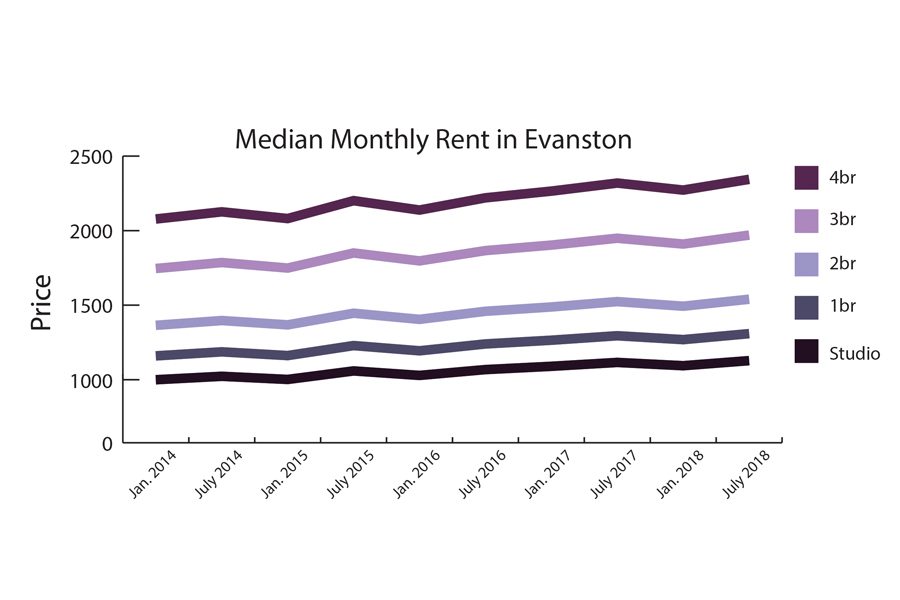Despite efforts to create more affordable housing, Evanston rent increases 2.3 percent
January 9, 2019
Though Evanston has strived to create more affordable housing, rents have increased 2.3 percent over the past year, according to a January 2019 report conducted by Apartment List.
Between 2004 and 2013, Evanston lost 40 percent of its affordable housing units to high-priced developments, according to the report. Although City Council passed measures in 2018 to support affordable housing, rent prices continued to increase. The report also said that comparable cities nationwide had more affordable housing than Evanston, and rents have been rising across the Chicago metropolitan area.
“(The report) provides evidence of why we have an affordable housing problem in Evanston,” Ald. Eleanor Revelle (7th) said. “When people say, ‘I can’t find anything I can afford,’ this report documents that’s true. There’s bigger demand for housing in Evanston at all income levels than there is a supply.”
Revelle, a member of the city’s Affordable Housing Plan Steering Committee, said residents with more money displace low-income people because of the housing shortage, putting more pressure on the market as a whole. The city has lost affordable housing over the years, Revelle said, due to the conversion of rental housing into condominiums.
Over the past year, the city has addressed rising housing prices. City Council amended city code in April 2018 to allow non-family members to rent coach houses. In October, the city incentivized developers to create more affordable housing through strengthening the Inclusionary Housing Ordinance. The change required developers to make at least 5 percent of their units affordable and increased the fee-in-lieu payments from $100,000 to $175,000 for any units they are not going to make into affordable housing developments.
Ald. Robin Rue Simmons (5th) said the increase in rent and housing costs have had an adverse effect on community demographics. She emphasized the importance of looking at the issue from a “complete community perspective.” When seeking solutions, Simmons said the city should not just address affordable housing but also address the wealth gap between residents of color and their white neighbors.
“We’ve had a substantial amount of minority families having to leave Evanston and relocate because of the lack of affordable housing both for rent and for purchase,” Simmons said.
Simmons said support for independent property owners as opposed to developers can help retain affordable housing units.
Although the city receives federal money for rental support programs, Revelle said they still need more resources to remove barriers to affordable housing.
“Everybody says they want to create more affordable housing,” Revelle said. “But we don’t have a lot of vacant land we can build on. The city itself doesn’t have a lot of money to put into building or creating more affordable housing.”
Data from the report shows that rent increases have occurred in seven cities across the Chicago metropolitan area over the past year. Although Revelle said Evanston is ahead of a lot of other communities in terms of the attention they’re giving to the issue, she said the city plans on reaching out to the Chicago Metropolitan Agency for Planning — a regional planning organization for northeastern Illinois including Cook County — to see if they can support Evanston’s planning efforts.
“It’s a regional problem — we can’t just solve it for Evanston,” Revelle said. “Because if we suddenly had a lot more affordable housing then we’d be attracting people from other communities where there’s not enough affordable housing. We have to solve the problem regionally and not just here in Evanston.”
Weinberg senior Tucker Johnson said he has two friends who are living in the same off-campus apartment building he rented sophomore year. He said they each pay $150 more per month than Johnson did two years ago.
From his own renting experience, Johnson noticed rent prices in the city are very inflated.
“Even two years ago, the rent we were paying just because we’re students, did not reflect the market value of the apartment,” Johnson said. “They’re basically slums. My apartment has a bunch of mold the landlord won’t deal with. The windows aren’t clean. They’re not so much landlords as they are slumlords. But they’re charging rent you would see down in Chicago for nice apartments with marble countertops.”
Email: [email protected]
Twitter: @cassidyw_


